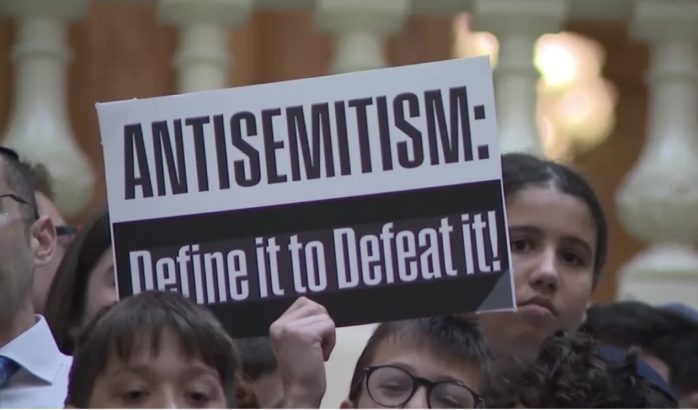President Biden is enlisting the support (and tax dollars) of every American in the fight against antisemitism – but this fight could take a very dark turn if we’re not careful.
by Kathryn Shihadah
The Biden administration recently released America’s first-ever comprehensive strategy to combat antisemitism – a strategy that lacks at least one critical component: a coherent idea of what antisemitism actually is. Antisemitism has been clearly defined and understood for many years, but a new “definition” has been manufactured recently that clouds the issue and may be dangerous.
A great deal is at stake as this definition battle rages on.
Antisemitism has traditionally been defined as prejudice or hatred against Jews because they are Jews – but in the last several decades, Israel partisans have attempted to supplant this definition. Some groups refer to what they call “the new antisemitism” – negative attitudes about the state of Israel (aka “the Jewish state”).
Proponents of the so-called new antisemitism see criticism of Israel as code: “vile Jew-hatred hiding behind anti-Israel comments,” or criticism of Israel as a veiled “call for nothing less than the elimination of Israel as a Jewish state.”
The ideology of Zionism calls for support for the Jewish state of Israel on the historic land of Palestine. Pro-Israel pundits have for years asserted that Zionism is a fundamental part Jewishness. Many Jewish (and non-Jewish) individuals and groups reject this idea – but pro-Zionism, pro-Israel voices are by far the loudest in the community.
Israel itself reinforces the Zionism-Judaism link by (falsely) claiming to represent all Jews. The Israel lobby in the US, politicians in both Israel and the US, and even the Israeli Mossad have made false claims of antisemitism as a means to marginalize critics of Israel.
An Israel-based definition
In 2005, in an attempt to boost the legitimacy of the so-called new antisemitism in the global community, powerful Israel advocacy groups created a “working definition” that characterized criticism of Israel as antisemitic (this definition grew out of one proposed earlier by the Israeli Minister for Jerusalem and Diaspora Affairs and Soviet dissident Natan Sharansky). Pro-Israel leaders immediately began promoting it around the world.
This definition is accompanied by eleven examples “which may serve as illustrations” – some of which can be (and have been) used to stifle criticism of Israel and even advocacy for Palestinian rights.
In 2016, the International Holocaust Remembrance Alliance (IHRA) adopted the definition; since then, influential individuals and groups have campaigned heavily (and often successfully) for its adoption by governments and universities around the world.
Since Israel partisans have been laying the groundwork for years, over 1,000 entities and counting (including 30 US states) have adopted the IHRA working definition of antisemitism.
In essence, what began as a call to end antisemitism has morphed into a call to end criticism of Israel and to stifle free speech around Palestinian rights.
Before Joe Biden was sworn in as president, over 50 powerful Jewish groups were already lobbying him to adopt IHRA as the official definition of antisemitism in the US. He has not done so – at least, not explicitly.
A rights-based definition
Many academics, legal experts, and Palestine advocacy groups have found fault with the IHRA definition.
Jewish academic and philosopher Judith Butler stated their grievance succinctly:
Conventionally, to call someone ‘antisemitic’ is to expose and condemn their racism; in the new case, the charge ‘antisemite’ is used to defend racism, and to sustain a regime that implements racist policies [emphasis added].
 Another newly created definition, the Nexus definition (created by a team that included Jewish scholars and historians, and released in 2021), was developed in response to IHRA’s flaws. It holds that criticism of Israel is as legitimate as criticism of any other state, and Israel must be accountable for its actions like every other state – even though it is “Jewish.”
Another newly created definition, the Nexus definition (created by a team that included Jewish scholars and historians, and released in 2021), was developed in response to IHRA’s flaws. It holds that criticism of Israel is as legitimate as criticism of any other state, and Israel must be accountable for its actions like every other state – even though it is “Jewish.”
For example, when advocates for Palestinian justice single out Israel or Zionism for criticism – without criticizing other countries that may be doing “worse” things – proponents of Israel consider this to be by default antisemitic.
The Nexus definition backgrounder (“White Paper”) disagrees:
There are numerous reasons for treating Israel differently or devoting special attention to Israel, among them that Israel receives more military aid than any other country or that someone has a special religious connection with Israel…
There are multiple reasons that people may have for opposing Zionism and/or Israel. Such opposition does not necessarily reflect specific anti-Jewish animus nor purposefully lead to antisemitic behaviors and conditions.
That is, Nexus acknowledges that opposition to Israel or Zionism is not the same as antisemitism.
Nexus acknowledges that support for the Palestinian cause is not by default antisemitic, and leaves room for opposition to Zionism, criticism of Israel, and BDS, the boycott, divest, and sanctions movement.
Nexus allows that it is possible to criticize Israel as a veiled form of antisemitism – but does not assume this is the case for all criticism of Israel, as does IHRA.
The Nexus White Paper also offers guidance on an important form of antisemitism that is often overlooked: the use of derogatory labels to describe Jews who criticize Israel or support Palestinian rights – for example, the term “self-hating Jew.” It declares,
Denigrating or denying the Jewish identity of certain Jews because they are perceived as holding the “wrong” position (whether too critical or too favorable) on Israel [is an antisemitic trope]. (Footnote: David Friedman, prior to becoming U.S. Ambassador to Israel called J Street supporters “worse than Kapos.”)
Rather than simply utilize the traditional definition of antisemitism, the Biden plan mentions both the IHRA and Nexus definitions by name as “valuable tools to raise awareness and increase understanding of antisemitism,” but does not express a preference for either one or refer to them by name elsewhere in the document.
When the antisemitism plan was released, many groups rejoiced that it did not embrace IHRA exclusively; others criticized the mere mention of another definition besides IHRA. For example, the World Jewish Congress (WJC) called the inclusion of Nexus “an unnecessary distraction from the real work that needs to be done.” CAM, the Combating Antisemitism Movement, declared, “If the White House wants its strategy to be a success, it must center its implementation efforts solely around the IHRA definition.”
Since the Biden strategy has not defined what the antisemitism fight is about, and has presented definitions of antisemitism that contain mutually exclusive elements, the outcome of the program depends entirely on how it is implemented.
[NOTE: Read the definitions in their entirety here (IHRA) and here (Nexus).]

What does the “new antisemitism” mean to Palestinians?
When Palestinians and their allies express their demands for justice or the right of return; when they try to commemorate the Nakba (the loss of their historic homeland in 1948); when they call for nonviolent boycott until Israel abides by international law – Israel partisans label these actions antisemitic, and often effectively silence their appeal.
This is such a clear violation of the American value of free speech that the American Civil Liberties Union (ACLU) has weighed in on the issue.
The accusations and censorship take place even though Palestine advocacy is fact-based – for instance, pro-Palestine events have been shut down for stating the truths that
- Israel is guilty of genocide and ethnic cleansing
- Israel is a settler colonial state
- Israel is an apartheid state
[NOTE: read about many examples of IHRA-related censorship here.]
With this backdrop, let us dip into the Biden plan to see how the two antisemitism definitions could bring about entirely different outcomes. The plan is 60 pages long and contains hundreds of action points, but we will look at just a few passages from each of the plans 4 pillars.
Biden Plan Pillar 1: Increase awareness and understanding of antisemitism
Biden’s strategy states,
In order to confront and counter antisemitism, Americans must recognize and understand it. Far too many do not. Without awareness of antisemitism and education about the threat it poses, Americans across society cannot identify and address antisemitism. If we cannot name, identify, and admit a problem, we cannot begin to solve it.
There are several definitions of antisemitism, which serve as valuable tools to raise awareness and increase understanding of antisemitism. The most prominent is the non-legally binding [IHRA] “working definition” of antisemitism…In addition, the Administration welcomes and appreciates the Nexus Document and notes other such efforts.
Already, at this early stage of the plan, the waters are murky. It is impossible to “recognize and understand” antisemitism without defining it clearly. Two rival definitions are as useless as none at all.
If Israel partisans exercise more influence that Palestinian justice advocates, IHRA will dictate what is and is not antisemitism. Efforts to bring justice to Palestinians will be shut down.
Biden Plan Pillar 2: improve safety and security for Jewish communities
Biden’s strategy states,
Data and evidence are the foundation for understanding a problem and addressing it.…We call on civil society organizations with expertise in antisemitism to share their information on and analysis of antisemitic content online with federal, state and local law enforcement.
The Anti-Defamation League (ADL) is the self-proclaimed “global leader in combating antisemitism,” and focuses on measuring and identifying antisemitism. It would appear a likely source of information and analysis in cooperation with the American government (in fact, the ADL was a partner in the development of the Biden plan).
However, there is a problem: when the ADL calculates antisemitic incidents, it includes expressions of solidarity with Palestinians in its statistics. (It also has sometimes included hoaxes in its tallies.)
The ADL has observed that incidents it identifies as antisemitic tend to spike when Israel attacks Gaza, or when another (of many) human rights organization reports that Israel practices apartheid.
It is worth noting that the ADL and other pro-Israel groups have managed to create “antisemitic freakouts” where none existed – with the dual goal of demonizing Palestine supporters and diverting America’s attention away from Israeli violence.
As Max Blumenthal reported in May 2021, after Israel had killed over 250 Palestinians in Gaza (a quarter of them children) in the space of 2 weeks (12 Israelis were also killed):
Led by the Anti-Defamation League (ADL), Israel lobbyists have portrayed a series of street scuffles between supporters of Palestine and pro-Israel activists as anti-Jewish pogroms. In nearly every case, no evidence exists to substantiate claims that Jews were targeted as Jews for violent assault. There is ample proof of deception, however, as video and photographic evidence reveals pro-Israel elements provoking demonstrators, initiating violence and falsifying or embellishing their testimonies.
(It is worth reading Blumenthal’s entire article.)
When Israeli brutality becomes front-page news, an American who visibly or vocally supports Israel may be criticized or ridiculed. Under IHRA, they can expect to be supported through misdirection, deception, and the stifling of their fellow citizens’ free speech rights. According to Nexus, as long as Israel supporters’ rights are intact, they can expect to live with the consequences of their ideology.
Biden Plan Pillar 3: reverse the normalization of antisemitism and counter antisemitic discrimination [and other forms of hate]
Biden’s strategy states,
Reports of antisemitic incidents have increased dramatically in many educational settings over the past several years. This is unacceptable.
On college campuses, Jewish students, educators, and administrators have been derided, ostracized, and sometimes discriminated against because of their actual or perceived views on Israel.
[O]ver 50% of Jewish students feel they pay a social cost if they support the existence of Israel as a Jewish state.
Our schools and campuses must feel and be safe for all people.
Ali Abunimah of the Electronic Intifada offers a concise response to this passage:
While no one should face violence or unlawful discrimination for their views, neither do they have a right to express racist and bigoted views without paying a “social cost.” In a free society, people rightly express their disgust when others voice their bigotry in public.
Similarly, just because a Jewish or non-Jewish person defines their support for Israel’s institutionalized anti-Palestinian bigotry and violence as part of their “identity” or “faith” does not exempt them from criticism.
Under the IHRA definition of antisemitism, students who feel uncomfortable when Israel is criticized or Palestinian rights are championed could expect such free speech to be silenced and criminalized. Under Nexus, the same students would merely have to cover their ears.
Biden’s strategy states,
We call on all actors in American society, whether those operating at the global, national, regional or local level, to review their association with and potential sponsorship or remuneration of individuals and entities that advance antisemitism. This might include reconsideration of a brand association, halting patronage of an antisemitic entity or individual, or “unfollowing” an account.
Advocates for Palestinian rights will recognize this passage as an obvious reference to the BDS (Boycott, Divest, and Sanction) movement. This call by the Biden administration, taken (as it usually does – and as it would under IHRA) to mean that any person or business that supports Palestinian rights may be denied opportunities to work, is unconstitutional.
Nevertheless, 35 states in the US currently have legislation in effect banning or limiting personal or corporate boycotting of Israeli goods (a number of states’ anti-BDS laws have been struck down by the courts).
Under Nexus, Americans’ right to political speech would be protected.
 The Biden strategy states,
The Biden strategy states,
To counter hate and antisemitism, the Biden-Harris Administration encourages all online platforms to independently commit to the following actions…Permanently ban repeat offenders…Establish relationships with Jewish community organizations to share best practices related to reporting hate speech and utilizing platforms to lift up Jewish stories.
The obvious danger here is that, under IHRA, Palestinian activists and their allies could find their voices permanently silenced, and pro-Israel Jewish organizations could end up in the driver’s seat in deciding what is and is not “hate speech.”
Notably, support for Israel among Americans in general and Jews in particular has been plummeting in recent years. Particularly in President Biden’s Democratic party, Israel has become unpopular.
The Biden plan’s indecisive language around antisemitism does not reflect the reality in his party. Even members of the Republican party do not strongly identify as Zionist.
It is possible that if the Biden plan incorporates IHRA, many Americans will not be eager to take on the action items that the plan is built on.
Biden Plan Pillar 4: build cross-community solidarity and collective action to counter hate
Biden’s strategy states,
It is imperative that non-Jewish and Jewish communities work together and stand up for each other in order to counter antisemitism and other forms of hate. It is essential that non-Jewish voices continue to speak out and intensify their efforts to combat antisemitism.
If the American Jewish community severs its artificial ties to the whims of a rogue state, it is likely to find many willing partners in the non-Jewish community to aid in the fight against antisemitism. Jewish groups and individuals enjoyed cross-community solidarity during the civil rights movement, and it can happen again. The majority of Americans already oppose antisemitism, and have a positive opinion of the Jewish community.
When American Jewish groups see Palestinians and their allies as fellow justice-seekers, they may even find themselves joining in the struggle for Palestinian rights. This – this struggle against Israel’s harmful policies – when undertaken by Jewish Americans, harmonizes with the Jewish philosophy of tikkun olam, repairing the world.
And when Jewish voices join with the many voices calling for Palestinian justice, Israel may succumb to the pressure to change its course. That would be a win for all sides.
Biden’s strategy states,
We call on members of Congress, individually and in bipartisan groups, to continue to speak out about combating antisemitism, including through efforts to educate their constituents…We call on state and local leaders…We call on employers—including states, cities, K-12 schools, institutions of higher education, private companies, and non-profits…We call on media…We call on professional sports leagues, sports clubs, and associations…We call on state, local, and private cultural institutions…We call on creators such as writers, producers, and directors…We call on influencers of all kinds—especially those in popular culture such as athletes, gamers, and entertainers—…We call on academic and other research institutions…
The sheer magnitude of Biden’s recruitment effort is breathtaking. The plan enlists the help of every influential group and individual in every arena of society to participate in eradicating antisemitism.
This is why it absolutely must be done right. Obliterating actual antisemitism would be a monumental achievement – obliterating advocacy for Palestinian rights and equality would be an immense travesty of justice.
Perhaps the most ominous passage in Biden’s 60-page strategy is this one from the introduction:
As we confront antisemitism, we do so…with an unshakable commitment to the State of Israel’s right to exist, its legitimacy, and its security. In addition, we recognize and celebrate the deep historical, religious, cultural, and other ties many American Jews and other Americans have to Israel.
This expression of unequivocal support for Israel – in the face of its ethnic cleansing, apartheid, and human rights abuses – is deeply problematic (the US gives Israel – without condition – over $10 million a day in military aid, which is illegal under our own laws.) The American government’s repeated failure to articulate any support for the Palestinian people is equally as troubling ($75 million in humanitarian and economic aid).
If support for a rogue state trumps support for justice and equality, something is fundamentally wrong with our country’s power structure.
Blaming the victim?
Is it antisemitic to call on Jewish organizations and individuals to make changes – to call out Israel’s brutality instead of recklessly supporting it?
Some Jewish groups have contributed to Jewish marginalization by demonizing Palestinians and their allies, and exaggerating the American Jewish connection to Israel.
To the extent that this continues – and Israel continues to oppress Palestinians – American anger at Israel and its supporters is bound to persist. Some Jewish Americans will feel discomfort because of this alliance. Throwing federal resources into a plan to protect those who embrace Israel (especially as they are part of a thriving population group) will serve to perpetuate Israel’s impunity and fuel American anger.
So, while some American Jews have indeed been on the receiving end of this anger, part of the blame must logically be laid at the feet of those whose influence has brought us to this point. Groups like the Anti Defamation League have led the charge against Palestine advocacy. They have also insinuated that Americans may not express their opinions, if said opinions are not flattering to Israel and its supporters.
At the same time, when supporters of Palestinian rights are left alone, more attention and resources can be turned toward eliminating real antisemitism and other forms of discrimination.
Facts are facts, and – as long as the IHRA definition is not America’s official standard – stating the facts is not antisemitic. If we do ever adopt IHRA, all bets are off.
Kathryn Shihadah is an editor and staff writer for If Americans Knew. She also blogs occasionally at Palestine Home.
RELATED READING ON PRO-ISRAEL “ANTISEMITISM”:
- International campaign is criminalizing criticism of Israel as ‘antisemitism’
- False antisemitism insulates Israel and hurts the movement for justice
- Jewish Congress launches campaign against ‘antisemitism’ (aka support for Palestinian rights)
- Killing Mosquitoes: The Gaza Massacres, Pro-Israel Media Bias, & the Weapon Of ‘Antisemitism’
- Emma Watson supports Palestine, Israeli leaders call “antisemitism”
- Israel advocates pass new definition of antisemitism at 15 more U.S. colleges
VIDEOS (IN THE WORDS OF JEWISH INDIVIDUALS):
- Former Mossad agent describes falsely accusing Israel critics of “anti-Semitism”
- Former Israeli politician says anti-Semitism accusation a “trick” to deflect criticism of Israel
- ADL’s Abe Foxman & Israeli grandmother disagree on “antisemitism”
- Israel lobby’s false claims of “antisemitism” – Israeli journalist Gideon Levy
- Professor Richard Falk speech at the First Global Conference on Israeli Apartheid





